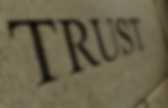

John Hagel: Trust Paradox. I love paradox, as anyone can tell from the name of the research center that I run with John Seely Brown in Silicon Valley – the Center for the Edge.
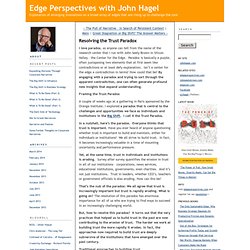
Paradox is basically a puzzle, often juxtaposing two elements that at first seem like contradictions or at least defy explanation. Isn’t a center for the edge a contradiction in terms? How could that be? By engaging with a paradox and trying to sort through the apparent contradiction, one can often generate profound new insights that expand understanding. Framing the Trust Paradox A couple of weeks ago at a gathering in Paris sponsored by the Orange Institute, I explored a paradox that is central to the challenges and opportunities we face as individuals and institutions in the Big Shift. In a nutshell, here’s the paradox. Yet, at the same time, trust in individuals and institutions is eroding.
Abandon Stocks, Embrace Flows - John Hagel III, John Seely Brown and Lang Davison - John Hagel III and John Seely Brown. By John Hagel III, John Seely Brown and Lang Davison | 6:58 PM January 27, 2009 Where’s the money?
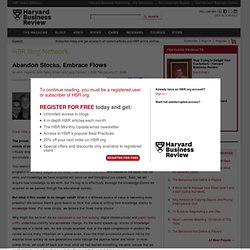
Used to be the answer was simple: in stocks of knowledge. If you knew something valuable, something nobody else could access, you had, in effect, a license to print money. All you needed to do was to protect and defend that knowledge and then deliver products or services based on that knowledge as efficiently and as broadly as possible.
Think of the proprietary formula for Coca Cola, or the patents protecting blockbuster drugs in the pharma industry. The power, simplicity, and success of this model explain why it is so deeply engrained in the minds of executives. This doesn’t just apply to firms. But what if this model is no longer valid? Why might this be true? To succeed now, we have to continually refresh our stocks of knowledge by participating in relevant flows of new knowledge. To keep it simple, think of tacit knowledge as the “know how” rather than the “know what.” Craig Newmark on the Web's Next Big Problem. I had the chance to sit down with Craigslist Founder Craig Newmark recently at his favorite breakfast spot in San Francisco, just a block or two from the house where Craigslist was launched 15 years ago this month.
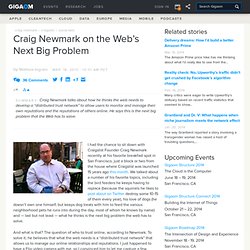
We talked about a number of his favorite topics, including the bird feeders he keeps having to replace (because the squirrels he likes to post about on Twitter destroy some 10-15 of them every year), his love of dogs (he doesn’t own one himself, but keeps dog treats with him to feed the various neighborhood pets he runs into during the day, most of whom he knows by name) and — last but not least — what he thinks is the next big problem the web has to solve.
And what is that? The question of who to trust online, according to Newmark. To solve it, he believes that what the web needs is a “distributed trust network” that allows us to manage our online relationships and reputations. Why Trust Matters & How To Earn It. Your spouse.
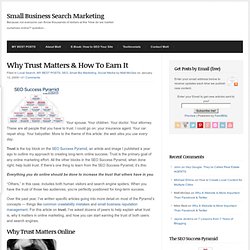
Your children. Your doctor. Your attorney. These are all people that you have to trust. I could go on: your insurance agent. Trust is the top block on the SEO Success Pyramid, an article and image I published a year ago to outline my approach to creating long-term online success. Everything you do online should be done to increase the trust that others have in you. “Others,” in this case, includes both human visitors and search engine spiders. Over the past year, I’ve written specific articles going into more detail on most of the Pyramid’s concepts — things like common crawlability mistakes and small business reputation management. Why Trust Matters Online Todd Malicoat: Trust is EVERYTHING to a sustainable business model. Jason Falls: Consumers have flocked online in good part because they stopped trusting corporations and brands. David Temple: It’s easier to build trust offline because you have an office, a store, a physical manifestation of your presence. Dr. Conclusion.
Trust (social sciences) - Wikipedia, the free encyclopedia. The Science of Building Trust With Social Media. DIGITAL: The Next Disruptive Tech on the Web? Trust. Strategic Uses of Trust.